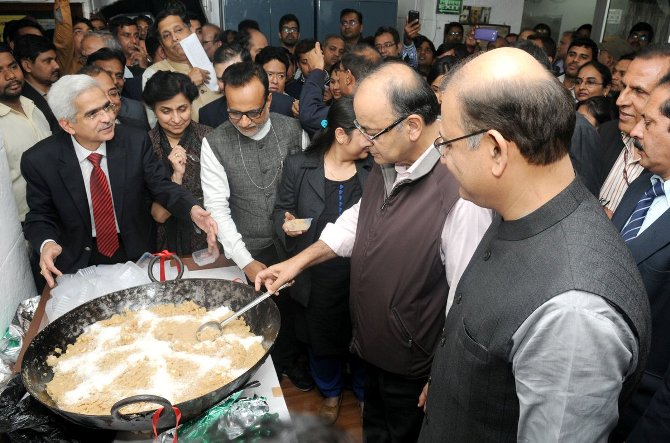 | « Back to article | Print this article |
 The Budget will be presented on February 29
The Budget will be presented on February 29
For the first time, a camera was allowed to pick up moving images from a government of India office in the basement of North Block and whose still photos were till now considered a state secret.
The images put up on the YouTube channel of the finance ministry were captured from the ritual halwa ceremony, held about 10 days before the general Budget is presented in Lok Sabha.
They did not reveal any state secrets but offered tantalising images of the office of the printing press where most of the Budget papers, including the speech of Finance Minister Arun Jaitley, is printed.
Yet, do the first-time images and the recent comments by ministry officials on deficit, taxation and others point to a larger trend in relaxation of the secrecy surrounding the general Budget?
Ashok Chawla, who saw through three Budgets in his term as secretary, economic affairs and then as finance secretary from September 2008 to January 2011, is circumspect.
“It is very unlikely that it could be part of a pattern to lower the veil of secrecy on the process,” he said.
The markets have, however, noticed the changes.
“They are now convinced after the detailed comments that the minister will stick to the target of fiscal deficit for this year,” said Saugata Bhattacharya, chief economist and senior vice-president at Axis Bank.
An example he referred to is the worry the debt market had about the Rs 1 lakh crore (Rs 1 trillion) of additional sum the states will borrow this financial year.
On Friday, the Centre came out with a press release to reassure investors that transfers to the states from the common tax pool were on track.
Vinod Rai (secretary, financial services, 2006 to December 2007) acknowledged there was a distinct change in the ‘audio level’ from the ministry, of late.
“The officials have definitely spoken out in detail on a number of issues,” he said, unlike a few years earlier when comments nearer to the Budget were reserved for only finance ministers, like P Chidambaram and Pranab Mukherjee.
Even Jaitley this time has been more forthcoming with detail.
For instance, speaking to the consultative committee attached to the ministry, Jaitley said this month: “We will be able to contain the fiscal deficit as per the target fixed for the current financial year 2015-16. . . .this was also the first time that the real expenditure amount was higher than the Budget proposal”.
At the same event in 2015, the minister had confined himself to generalities.
“The overall economic situation in the country is looking better and basic parameters of Indian economy are moving in the right direction. . . our major challenges will be to boost investment, especially in infrastructure and give further boost to both manufacturing and agriculture sectors, among others.”
Going deeper into details last week, Revenue Secretary Hasmukh Adhia said, “This will be the first time after five years that the government will be able to achieve the Budget estimate target of tax collections.”
He made the comments during a television interview.
According to him, “The government will be able to achieve the overall tax collection target of Rs 14.4 lakh crore (Rs 14.4 trillion) for direct and indirect taxes in FY16.”
Usually by February, the revenue secretary moves into what is loosely described as a “silent zone”.
Adhia was, however, explicit in describing what macro numbers to expect in the Budget speech.
In the eight-week period from January 1, Jaitley’s team has appeared for 33 television interviews, compared with less than 10 last year.
“Perhaps the trigger for the increased public noise is the jittery state of the market and the huge exodus of foreign investors from portfolio investment, the unstable rupee and consequences of the steep fall in oil prices, which while it had a positive short-term effect, could have an adverse medium- to long-term effect,” says K M Chandrasekhar, revenue secretary at the ministry from October 2004 to May 2007.
The former Cabinet secretary is on the same page as Chawla about whether the ministry has showed more of its tricks earlier than the Budget day.
“I don’t think one should read too much of a pattern in the soundbites of North Block mandarins.
"These seem to be in the nature of what is called obiter dicta in the judicial system.
As in the court system, here, too, it is possible that the final Budget architecture may be at variance with the comments of these gentlemen.
It is also possible that the comments may be in the nature of trial balloons,” adds Chawla, despite the signals from telecast of the halwa ceremony.
ON THE BEAM
Appearance on TV channels by finance ministry officials to talk on Budget topics (between January 1 & February 20)
Image: Finance Minister Arun Jaitley with the Budget-eve halwa. Photograph: Kind courtesy, Press Information Bureau.